In the world of CRM solutions, the “HubSpot vs Salesforce” comparison is crucial for businesses seeking the optimal platform to boost their customer relationship management. This article provides an in-depth analysis of these two leading CRM players in 2024. We examine their user interfaces, features, pricing, security, and mobile experiences to offer a comprehensive guide that highlights their capabilities and guiding factors. This enables businesses to make an informed decision that aligns with their specific CRM needs.
- Ease of Use
- Feature Set
- Customization Capabilities
- Integration and Compatibility
- Marketing Automation
- Sales and CRM Functionality
- Analytics and Reporting
- Customer Support and Resources
- Pricing and Plans
- Security and Compliance
- Community and Ecosystem
- Mobile Experience
- Customer Reviews and Case Studies of Hubspot vs Salesforce
- Conclusion
Ease of Use
When comparing HubSpot vs Salesforce, one of the most critical aspects for users is the ease of use. This factor is particularly significant for businesses that require a CRM system that can be quickly adopted by their teams without a steep learning curve.
HubSpot’s User Experience
HubSpot is renowned for its user-friendly interface. The platform is designed with simplicity in mind, making it accessible even for those who are new to CRM systems. The intuitive design ensures that finding information and navigating through different features is straightforward. This user-friendliness is evident right from the dashboard, which presents a clear view of sales pipelines, performance metrics, and daily tasks.
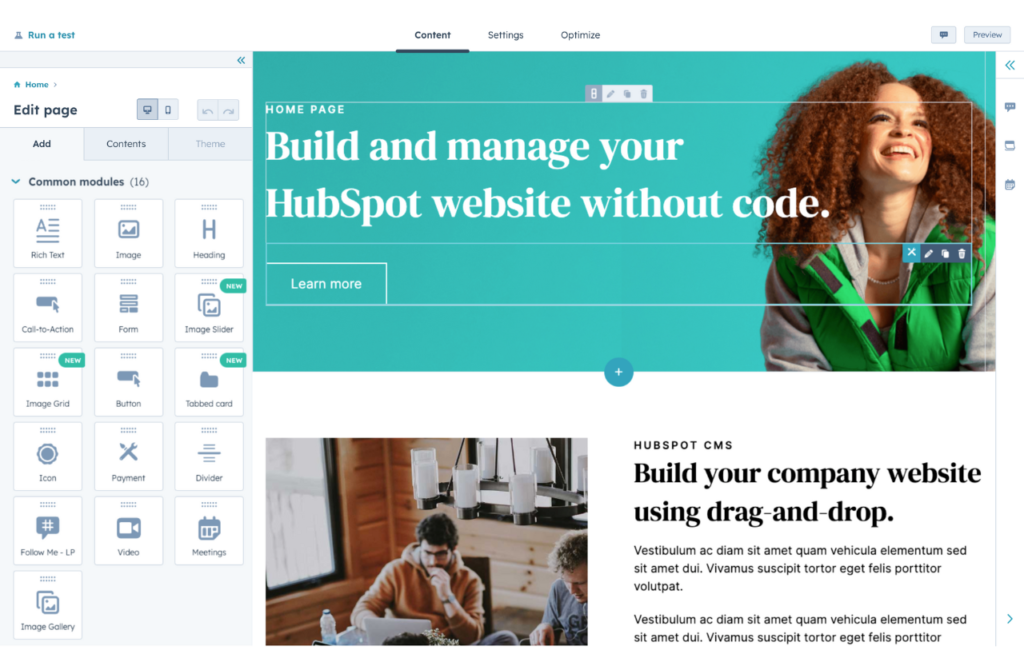
Moreover, HubSpot offers a comprehensive onboarding process. New users are guided through the system with helpful tips and tutorial videos, which simplifies the initial setup and customization. This emphasis on a gentle learning curve makes HubSpot a preferred choice for businesses looking for an efficient and easy-to-use CRM solution.
Salesforce’s User Experience
On the other hand, Salesforce, while offering a more robust set of features, is often perceived as having a more complex interface. This complexity can be attributed to its extensive customization capabilities and advanced features. For users who are not as tech-savvy or for organizations without a dedicated IT team, this might pose a challenge.
However, Salesforce counters this complexity with its comprehensive training platform, Trailhead. Trailhead offers interactive learning modules that guide users through various features and functionalities of Salesforce. While this learning platform is highly effective, it does indicate a steeper learning curve compared to HubSpot.

Conclusion
In the HubSpot vs Salesforce debate regarding ease of use, HubSpot takes the lead for its intuitive design and straightforward user experience. Salesforce, while offering a powerful platform, requires a bit more time and effort to master. Ultimately, the choice between HubSpot and Salesforce may come down to the specific needs of your business and the level of complexity you’re comfortable managing.
An infographic comparing the ease of use of both platforms could be a powerful visual addition here.
Feature Set
A critical aspect of our comparison between HubSpot vs Salesforce involves examining the feature sets each platform offers. Understanding the capabilities of each CRM is essential for businesses to determine which tool aligns best with their operational needs.
HubSpot’s Feature Range
HubSpot provides an impressive array of features, particularly in its marketing automation, which is the cornerstone of its functionality. The platform is widely recognized for its inbound marketing tools, including content creation, SEO optimization, social media marketing, and email marketing. HubSpot’s CRM also provides efficient contact and lead management, deal tracking, and pipeline management, which are straightforward and user-friendly.
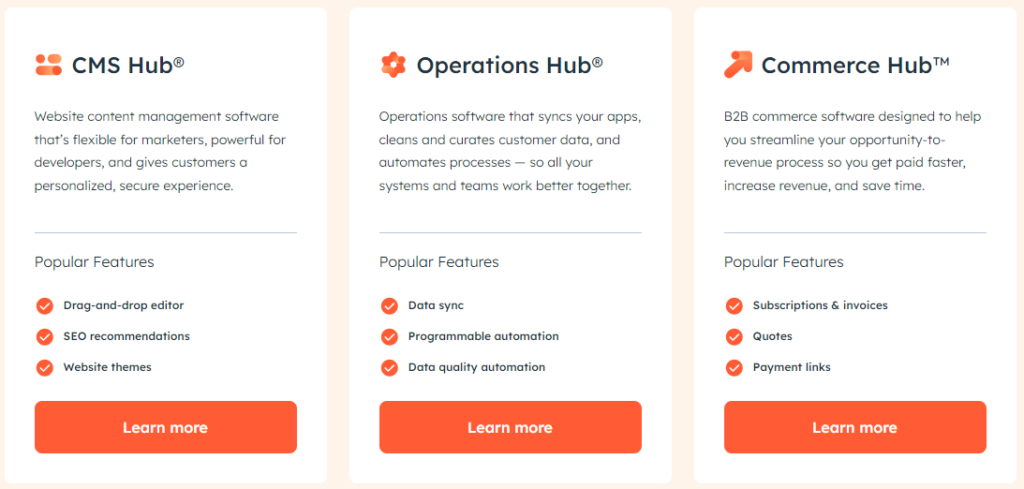
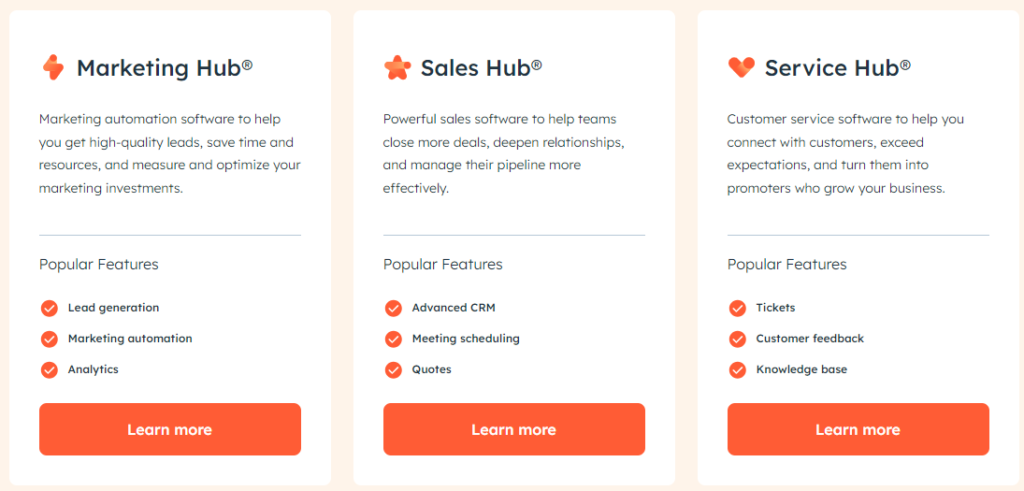
Additionally, HubSpot offers a range of sales and service features, like automated sales processes, ticketing, live chat, and a knowledge base. These features are designed to enhance customer relations and streamline sales and support processes.
Salesforce’s Feature Range
In contrast, Salesforce, often considered the powerhouse in CRM solutions, offers a more extensive and customizable feature set. Its primary strength lies in its advanced sales and customer relationship management capabilities. Features such as sales forecasting, lead scoring, customer journey mapping, and advanced analytics stand out.
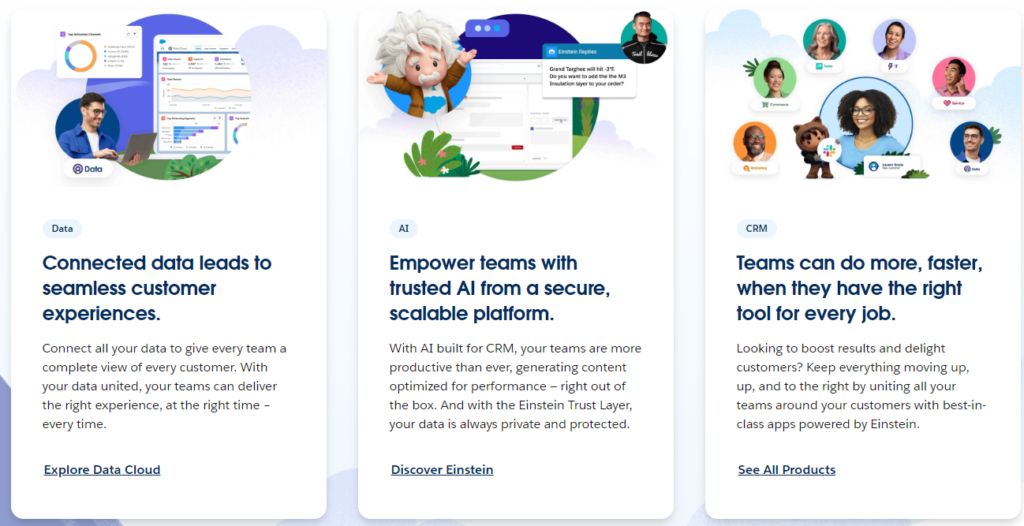
Furthermore, Salesforce’s platform is highly scalable and customizable, making it suitable for businesses with complex needs and processes. It provides robust integration capabilities with numerous third-party applications, enhancing its functionality.
Comparing the Feature Sets
When weighing HubSpot vs Salesforce in terms of feature sets, it’s essential to consider your business size and needs. HubSpot shines for businesses seeking a straightforward, all-in-one marketing and CRM solution, especially for inbound marketing. Salesforce, on the other hand, is better suited for larger businesses or those with more complex CRM and sales processes, requiring a higher degree of customization and scalability.
Customization Capabilities
When exploring the customization capabilities of HubSpot vs Salesforce, it’s crucial to understand how each platform allows businesses to tailor their CRM experience to meet specific needs and workflows.
HubSpot’s Customization Features
HubSpot offers a range of customization options, particularly beneficial for small to medium-sized businesses. Users can easily tailor their dashboard to display the most relevant data, create custom reports, and set up personalized email templates. HubSpot’s CRM also allows for the customization of deal stages, fields, and sales pipelines to match the unique sales processes of different businesses.

While HubSpot provides a user-friendly interface for customization, it tends to be more limited in depth compared to Salesforce. Its customization features are designed to be straightforward and easy to implement, making it a great choice for businesses with simpler processes or those without extensive technical resources.
Salesforce’s Customization Features
Salesforce, on the other hand, is known for its extensive customization capabilities. It offers a highly flexible platform that can be tailored to a wide range of business needs. Salesforce allows for deep customization in virtually every aspect, from creating custom objects and fields to developing bespoke workflows and automation rules. The platform also supports extensive API integrations, enabling businesses to connect and synchronize with a wide range of third-party applications and services.

Salesforce’s high degree of customization is particularly suitable for large enterprises or businesses with complex processes and unique requirements. However, this level of customization often requires a certain level of technical expertise or the assistance of a Salesforce developer.
Balancing Customization with Usability
In comparing the customization capabilities of HubSpot vs Salesforce, it’s evident that Salesforce offers more depth, catering to businesses requiring extensive customization. HubSpot, while more limited in customization depth, offers a more accessible and user-friendly approach, ideal for businesses with straightforward processes or limited technical resources.
Integration and Compatibility
In the dynamic world of CRM solutions, the integration and compatibility capabilities of platforms like HubSpot and Salesforce are crucial. Let’s delve into how these two giants, HubSpot vs Salesforce, stand in 2024 in terms of integrating with other tools and systems.
HubSpot’s Integration Ecosystem
HubSpot offers a robust integration ecosystem that allows businesses to connect a variety of tools and applications seamlessly. From email marketing platforms like MailChimp to social media tools like LinkedIn, HubSpot ensures that key marketing, sales, and service tools work in tandem without hassle. Its App Marketplace is expansive, featuring a wide array of integrations that cater to various business needs.
One of HubSpot’s standout features is its native integration with many tools, ensuring smooth data flow and user experience. Additionally, HubSpot’s API is quite flexible, allowing for custom integrations, which can be particularly beneficial for businesses with unique needs.
Salesforce’s Compatibility and Integration Options
Salesforce, known for its adaptability, excels in the realm of integration and compatibility. Its platform is designed to integrate with a vast number of applications, ranging from small third-party tools to large enterprise systems. Salesforce’s AppExchange is a testament to its commitment to providing a diverse range of integration options, including advanced analytics tools, ERP systems, and more.
Furthermore, Salesforce offers robust API capabilities, which allow for deep and complex integrations. This level of compatibility is particularly advantageous for larger organizations or those with specialized, custom workflows.
Comparing Integration Strengths
Comparing HubSpot vs Salesforce in 2024 for integration and compatibility reveals that both platforms offer strong and diverse integration options, but with different focuses. HubSpot caters more to straightforward, efficient integration with popular business tools, making it ideal for small to medium-sized businesses. Salesforce, however, offers more in terms of depth and customization, suitable for larger businesses or those with specific, complex integration needs.
Marketing Automation
In the competitive realm of CRM solutions, the efficiency and sophistication of marketing automation tools are pivotal. Let’s compare HubSpot vs Salesforce in 2024 to see how their marketing automation features stack up.
HubSpot’s Marketing Automation Strengths
HubSpot is renowned for its superior marketing automation features, which are intuitive and user-friendly. This platform excels in inbound marketing strategies, offering tools for email marketing, social media management, content marketing, and lead nurturing. The automation workflows in HubSpot are easy to set up and manage, allowing businesses to automate their marketing tasks effectively, from lead capture to conversion.
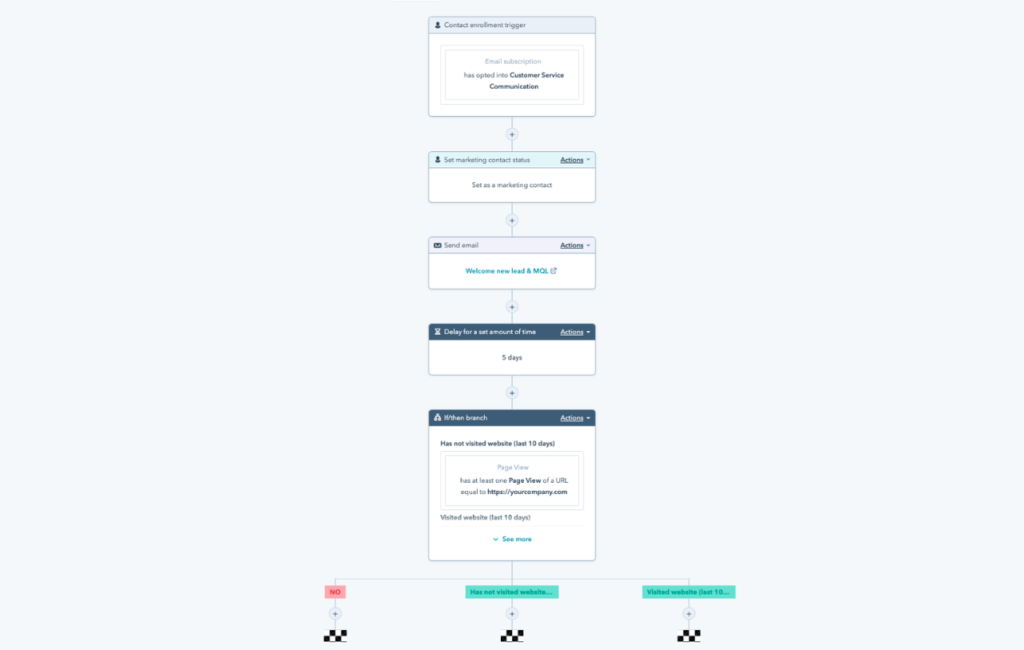
What sets HubSpot apart is its seamless integration between different marketing channels, providing a unified approach to managing and analyzing marketing campaigns. The platform’s strength lies in its ability to automate repetitive tasks while offering personalized experiences to the end-users.
Salesforce’s Marketing Automation Capabilities
Salesforce, while initially more focused on sales and CRM, has significantly expanded its marketing automation capabilities. It offers a robust set of tools under its Marketing Cloud, including journey builder, email studio, social studio, and advertising studio. Salesforce’s marketing automation is highly customizable and data-driven, suitable for complex marketing strategies and large-scale campaigns.

Salesforce’s marketing automation excels in delivering a more personalized and targeted customer journey. It leverages advanced analytics and AI-driven insights to tailor marketing efforts to individual customer preferences and behaviors, making it ideal for businesses with diverse and large customer bases.
Evaluating the Best Fit for Your Business
In comparing HubSpot vs Salesforce for marketing automation, it’s clear that both offer strong capabilities but cater to different business needs. HubSpot is ideal for businesses seeking a straightforward, integrated approach to inbound marketing automation. In contrast, Salesforce fits businesses looking for a highly customizable and data-driven marketing automation platform.
Sales and CRM Functionality
A key aspect of any CRM comparison, especially when looking at HubSpot vs Salesforce in 2024, is the effectiveness and range of their sales and CRM functionalities. Let’s delve into how each of these platforms supports sales teams and manages customer relationships.
HubSpot’s Sales and CRM Features
HubSpot has made a name for itself with a CRM system that is remarkably user-friendly and efficient. It offers a comprehensive suite of sales tools that include contact and lead management, email tracking, meeting scheduling, and a customizable sales pipeline. The platform is designed to streamline the sales process, making it easier for teams to track interactions and manage leads.
What sets HubSpot apart in this arena is its emphasis on simplicity and ease of use. The CRM interface is intuitive, ensuring that sales teams can focus more on selling and less on navigating a complex software system. This approach makes HubSpot an excellent choice for small to medium-sized businesses or those with limited IT resources.
Salesforce’s Sales and CRM Capabilities
Salesforce, on the other hand, is known for its robust and feature-rich CRM capabilities. It offers a wide array of advanced sales tools, including detailed customer insights, lead scoring, complex sales forecasting, and comprehensive customer journey mapping. Salesforce is designed for scalability, accommodating the needs of large enterprises and businesses with complex sales processes.
The strength of Salesforce lies in its deep customization capabilities and extensive reporting features. It allows sales teams to gain in-depth insights into customer behavior and sales trends, enabling data-driven decision-making. However, this level of sophistication might require a steeper learning curve and potentially more resources for implementation and management.
Choosing the Right Platform for Sales and CRM
In the comparison of HubSpot vs Salesforce for sales and CRM functionality, the choice depends on your business needs. HubSpot offers a more accessible and straightforward solution, ideal for businesses seeking ease of use and efficiency. Salesforce, with its comprehensive and customizable system, is better suited for larger organizations or those requiring detailed sales analytics and advanced CRM functionalities.
Analytics and Reporting
In the realm of CRM solutions, the power of analytics and reporting cannot be understated. Let’s dive into how HubSpot and Salesforce, two leading platforms in 2024, stack up in these crucial areas.
HubSpot’s Analytics and Reporting Tools
HubSpot offers a range of analytics and reporting features that are both intuitive and insightful. The platform provides real-time data on website performance, marketing campaign effectiveness, sales activities, and customer interactions. This information is vital for businesses looking to understand their customer journey and improve their marketing and sales strategies.
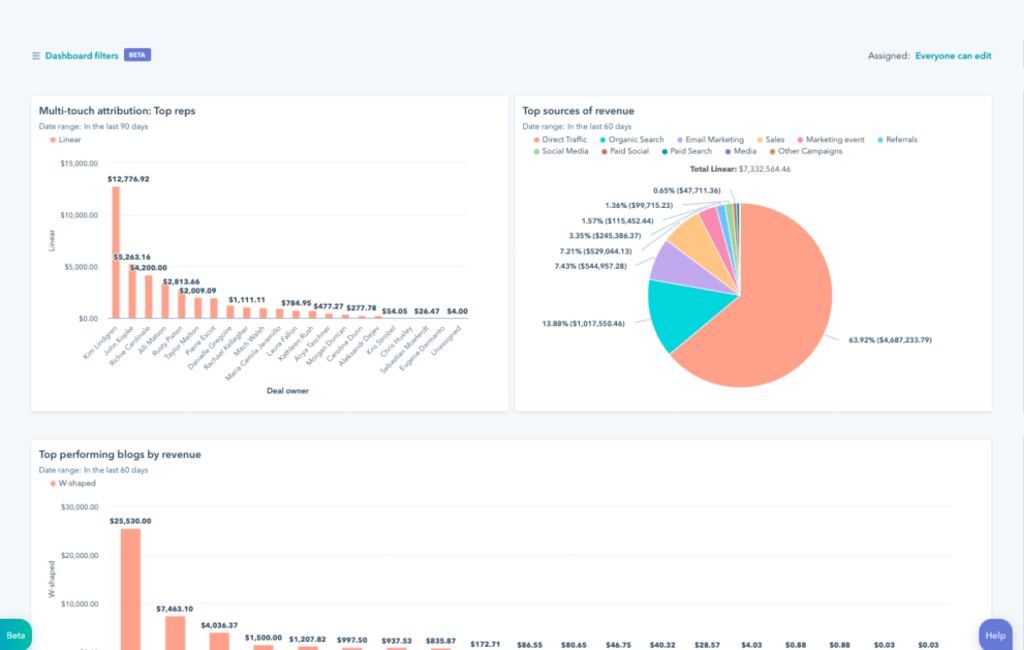
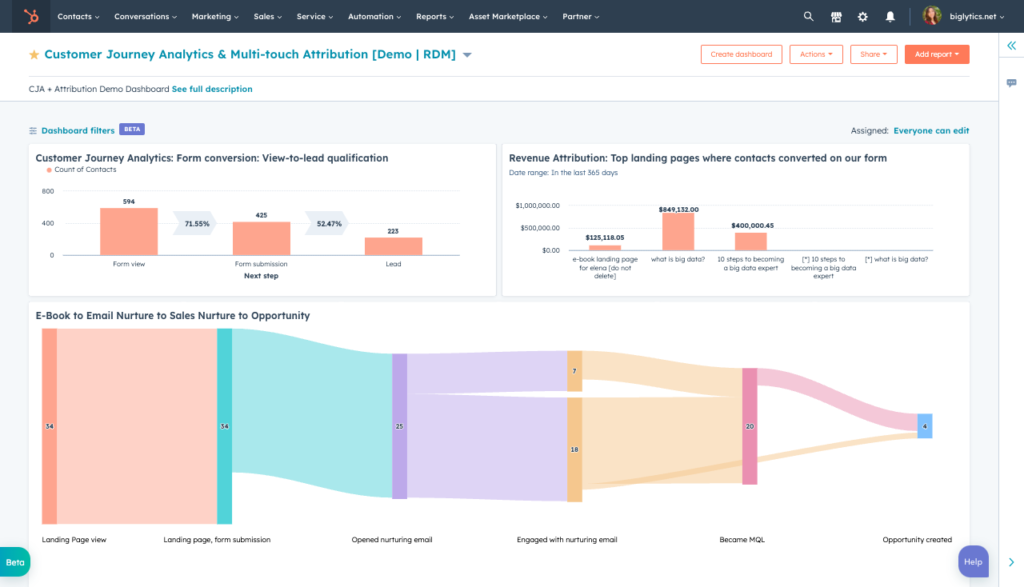

One of the strengths of HubSpot’s analytics is the user-friendly interface, which makes data accessible even to those who are not data experts. The platform allows for the creation of custom reports and dashboards that can be tailored to specific business needs, enabling quick and informed decision-making.
Salesforce’s Reporting and Analytics Capabilities
Salesforce, renowned for its comprehensive approach to CRM, offers highly advanced analytics and reporting capabilities. The platform provides detailed insights into various aspects of business operations, from sales forecasting and performance metrics to customer behavior and trends.
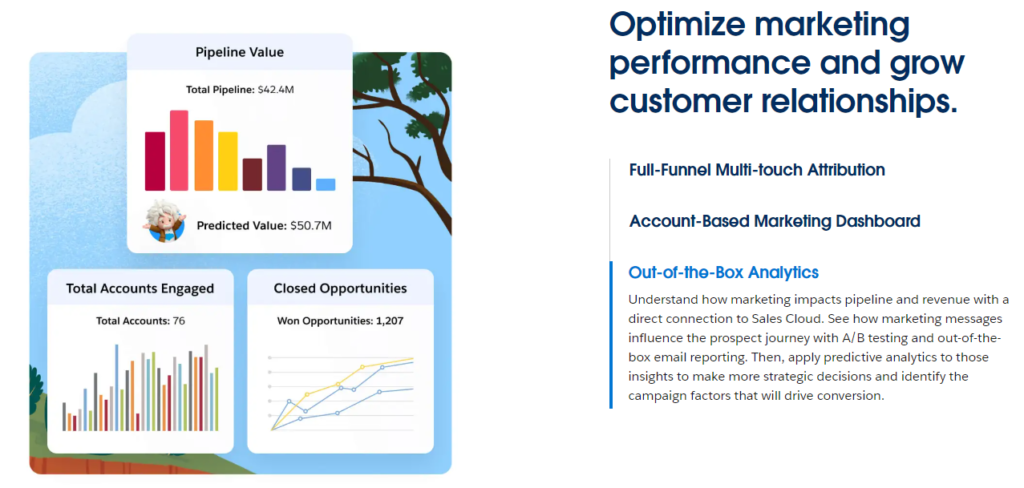
Salesforce excels in delivering deep analytics through features like Einstein Analytics, which uses AI to provide predictive insights and recommendations. This level of sophistication is particularly beneficial for larger businesses or those with complex sales and marketing processes that require detailed analysis.
Evaluating Analytics and Reporting for Your Needs
When comparing HubSpot vs Salesforce in terms of analytics and reporting, the decision largely hinges on the complexity of your needs and your team’s technical proficiency. HubSpot offers simplicity and ease of use, making it ideal for smaller businesses or those with straightforward reporting needs. Salesforce, with its detailed and customizable analytics, caters to larger organizations that require in-depth data analysis and predictive insights.
Customer Support and Resources
When it comes to CRM solutions, the quality of customer support and the availability of resources play a critical role in user experience and satisfaction. In this section, we’ll compare HubSpot vs Salesforce in 2024, focusing on their customer support services and educational resources.
HubSpot’s Approach to Customer Support
HubSpot is known for its exceptional customer support and extensive range of educational resources. The platform offers support through various channels, including email, phone, and live chat, ensuring that users can get assistance when they need it. HubSpot’s support team is praised for being responsive, knowledgeable, and helpful.

Apart from direct support, HubSpot provides a wealth of resources for users to learn and grow. This includes an extensive knowledge base, the HubSpot Academy with free online training courses, and a community forum where users can share insights and tips. These resources are invaluable for businesses looking to maximize their use of the HubSpot platform.
Salesforce’s Customer Support and Educational Offerings
Salesforce, on the other hand, offers a robust customer support system with a variety of options for users to seek help, including a dedicated support hotline, online chat, and a ticketing system. Salesforce is known for its professional and comprehensive support, particularly for complex issues or technical queries.
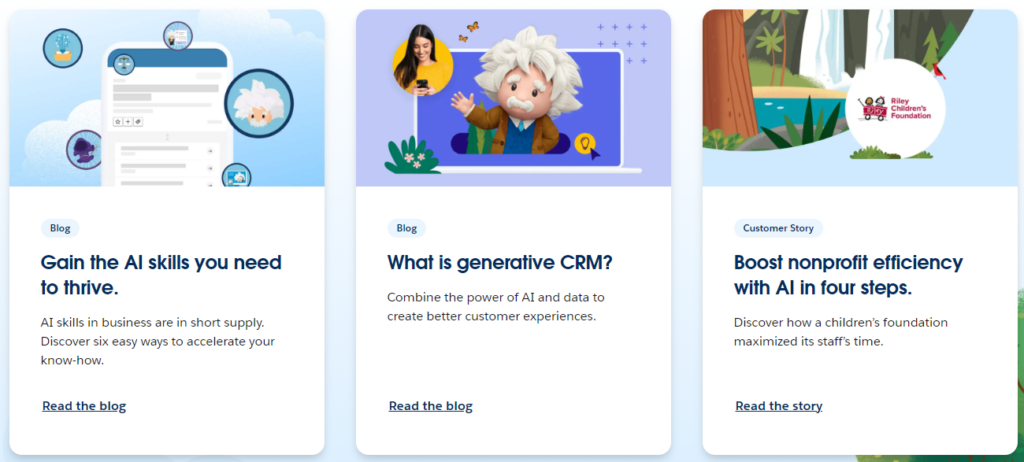

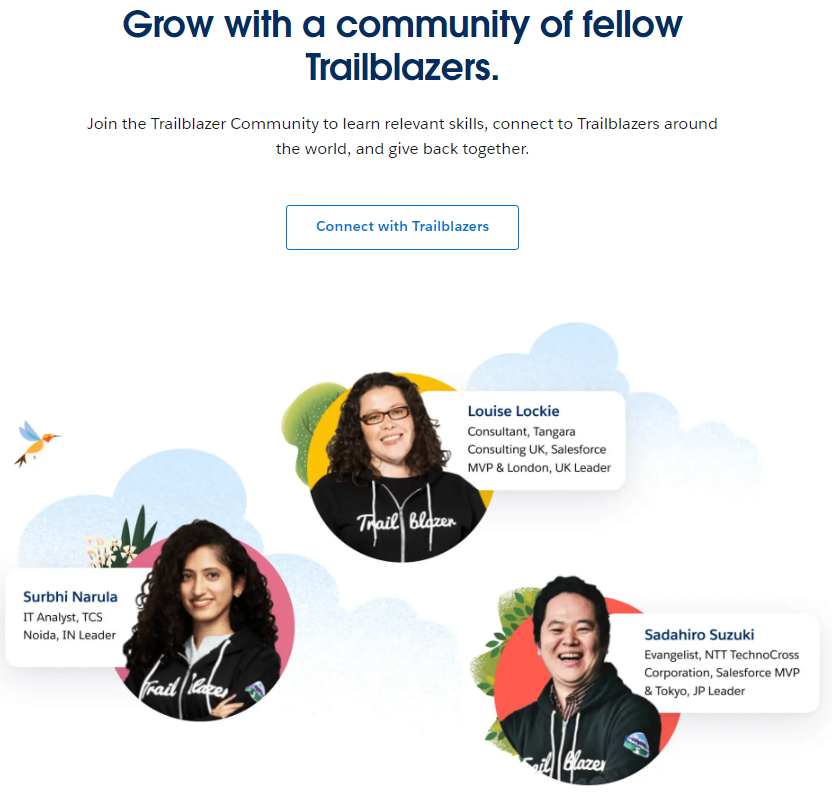
In terms of resources, Salesforce stands out with its Trailhead platform, offering interactive learning modules on various aspects of the Salesforce ecosystem. This gamified approach to learning is particularly engaging and useful for users at all levels. Additionally, Salesforce maintains a comprehensive knowledge base and an active user community.
Comparing Support Services and Learning Resources
In comparing HubSpot vs Salesforce for customer support and resources, both platforms show strong commitments to user support and education. HubSpot may be more appealing to those looking for straightforward support and a wealth of easy-to-digest educational content. Salesforce, with its detailed support system and interactive learning platform, is ideal for users who require more in-depth technical support and advanced learning resources.
Pricing and Plans
Understanding the pricing and plans of CRM solutions is crucial for businesses to make informed decisions. In this section, we explore the different pricing structures and plan options offered by HubSpot vs Salesforce in 2024.
HubSpot’s Pricing Structure
HubSpot is known for its flexible pricing plans, catering to a range of business sizes and needs. The platform offers a free version with basic CRM features, which is a great starting point for small businesses or those new to CRM systems. As businesses grow, they can scale up with HubSpot’s paid plans, which include the Starter, Professional, and Enterprise levels.

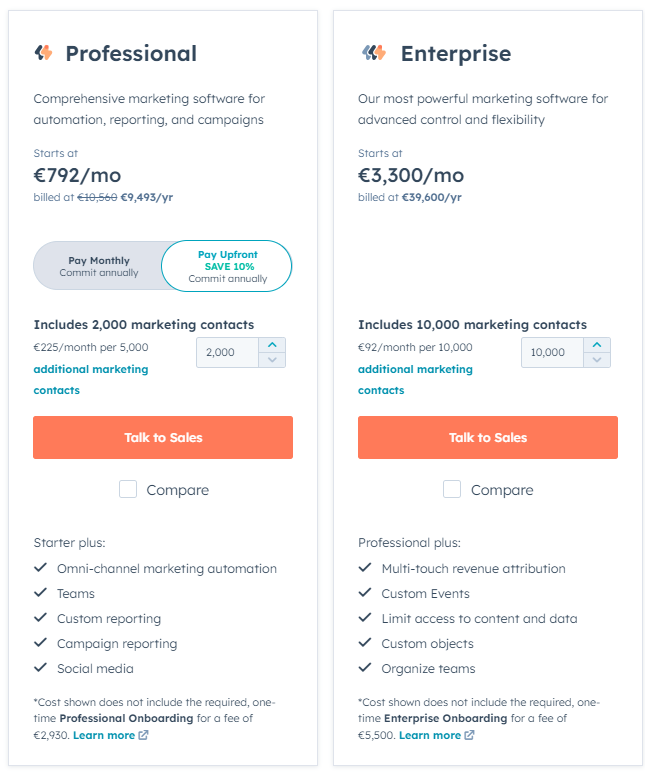
The pricing for HubSpot’s plans varies based on the level of functionality and the number of users. One of HubSpot’s advantages is its transparent pricing structure, with no hidden fees, making it easier for businesses to budget and plan their CRM investment.
Salesforce’s Plan Options
Salesforce offers a more segmented pricing structure, with several tiers designed to meet diverse business requirements. The plans include Essentials, Professional, Enterprise, and Unlimited, each offering an increasing range of features and customization options.
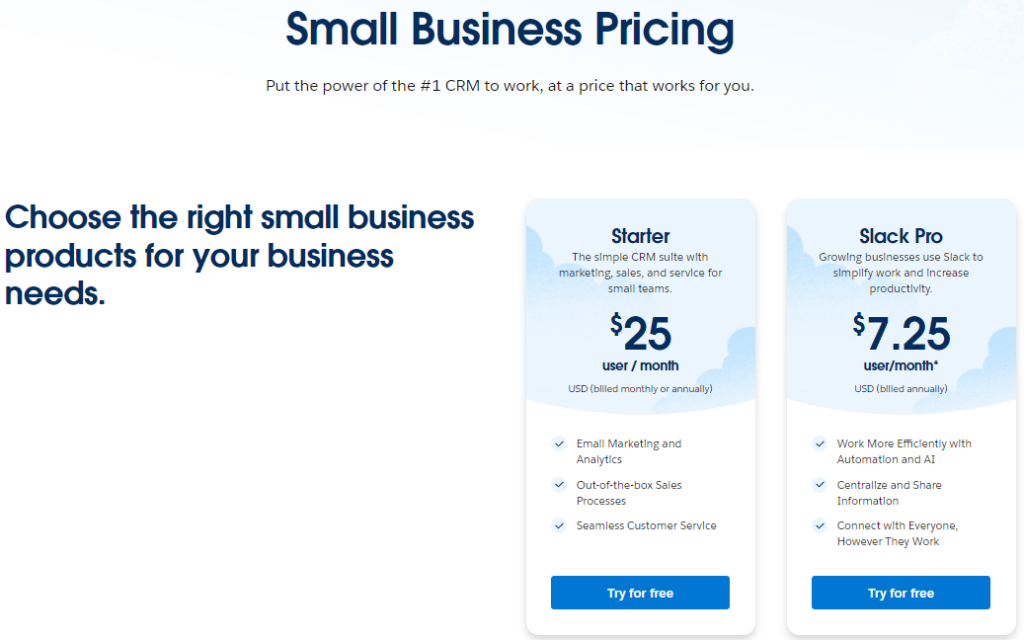
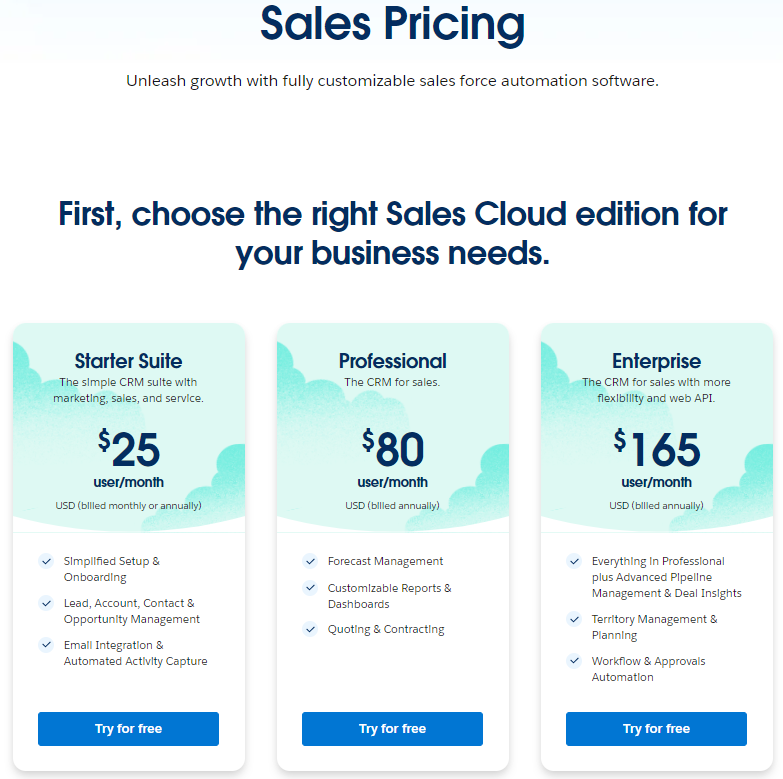

Salesforce’s pricing can be more complex than HubSpot’s, as it often depends on the level of customization, the number of users, and the specific modules required. While Salesforce can be more expensive, its comprehensive feature set and scalability make it a suitable investment for larger businesses or those with advanced CRM needs.
Comparing CRM Investment Value
When comparing HubSpot vs Salesforce in terms of pricing and plans, it’s important to consider the total value of investment against your business requirements. HubSpot offers a more straightforward and budget-friendly option with its free tier and clear pricing for growing businesses. Salesforce, with its customizable and scalable plans, is ideal for larger organizations or those requiring a highly tailored CRM solution.
Security and Compliance
In today’s digital landscape, the security and compliance of CRM platforms are of paramount importance. Let’s evaluate how HubSpot and Salesforce, two leaders in the CRM space, handle these critical aspects in 2024.
HubSpot’s Security Measures
HubSpot takes security seriously, offering robust measures to protect user data and ensure compliance with various regulatory standards, including GDPR. The platform employs advanced security protocols such as SSL encryption, two-factor authentication, and regular third-party security testing to safeguard user information.



Additionally, HubSpot provides users with comprehensive control over their data and privacy settings, making it easier for businesses to adhere to their specific compliance requirements. The platform’s transparency in its security practices helps users trust and rely on HubSpot for their CRM needs.
Salesforce’s Approach to Security and Compliance
Salesforce is renowned for its rigorous approach to security and compliance. The platform offers a comprehensive set of security features, including robust data encryption, user authentication, and detailed audit trails. Salesforce’s commitment to security is evident in its regular security updates and strict compliance with international standards.
Salesforce’s sophisticated security infrastructure is designed to meet the needs of large enterprises and organizations with stringent security requirements. The platform’s ability to customize security settings allows businesses to fine-tune their CRM environment to align with specific regulatory demands.
Evaluating CRM Security for Your Business
In comparing HubSpot vs Salesforce regarding security and compliance, both platforms demonstrate a strong commitment to protecting user data and adhering to regulatory standards. HubSpot offers user-friendly security features suitable for small to medium-sized businesses, while Salesforce provides a more advanced security framework, ideal for larger enterprises with complex security needs.
Community and Ecosystem
A vibrant community and a robust ecosystem are essential for any CRM platform’s success. In this part of our HubSpot vs Salesforce comparison for 2024, we explore how each platform fares in terms of community engagement and the breadth of their ecosystems.
HubSpot’s Community and Ecosystem
HubSpot boasts a thriving community that’s highly engaged and supportive. The HubSpot Community is a platform where users, developers, and enthusiasts come together to share ideas, solve problems, and collaborate. This community is an invaluable resource for networking, learning from peers, and staying updated on the latest trends and best practices.
In addition to its community, HubSpot’s ecosystem includes a vast array of integrations and partnerships, which enhance the platform’s capabilities. The HubSpot App Marketplace is teeming with apps and integrations that allow users to extend the functionality of their CRM and marketing systems.
Salesforce’s Ecosystem and Community Engagement
Salesforce, recognized for having one of the largest and most diverse ecosystems in the CRM world, offers a wide range of resources and community engagement opportunities. The Salesforce ecosystem includes a multitude of developers, consultants, and app partners who continually expand and enrich Salesforce’s capabilities.
The Salesforce Trailblazer Community is a dynamic and resourceful platform for users to connect, learn, and grow. Members can participate in discussions, find answers, join groups, and attend global community events. This community plays a crucial role in fostering collaboration and innovation within the Salesforce ecosystem.
Comparing the Platforms’ Community Strengths
When comparing HubSpot vs Salesforce in terms of their community and ecosystem, both platforms offer rich and supportive environments. HubSpot’s community is ideal for users seeking a friendly and collaborative space, while Salesforce’s ecosystem caters to those looking for a vast network with extensive resources and professional growth opportunities.
Mobile Experience
In our increasingly mobile-centric world, the quality of a CRM’s mobile experience is critical. Let’s compare the mobile capabilities of HubSpot vs Salesforce in 2024, assessing how each platform supports users on the go.
HubSpot’s Mobile App Functionality
HubSpot offers a user-friendly mobile app that allows users to access key CRM functionalities from their mobile devices. The app is designed for ease of use, enabling sales teams to manage contacts, view deal pipelines, and access company information quickly. The interface is clean and intuitive, mirroring the simplicity of the desktop version.
The HubSpot mobile app also provides useful features like push notifications and the ability to log calls or emails, keeping users connected and productive while away from the office. This mobile solution is particularly beneficial for small to medium-sized businesses that require on-the-go access without complexity.
Salesforce’s Mobile Experience
Salesforce offers a comprehensive mobile experience with its Salesforce Mobile App. This app provides extensive CRM functionalities, including access to custom reports, dashboards, and advanced analytics. Users can perform a wide range of tasks, from managing leads to tracking sales activities, directly from their mobile devices.
The Salesforce Mobile App stands out for its customization options, allowing businesses to tailor the mobile experience to their specific needs. While the app offers a broad range of features, it may require some time for users to familiarize themselves with the interface, especially if they use highly customized Salesforce environments.
Evaluating Mobile CRM Solutions
In comparing HubSpot vs Salesforce for mobile experience, both platforms offer robust solutions but cater to different user preferences. HubSpot’s mobile app is ideal for those who value simplicity and ease of use, offering a straightforward way to access CRM data on the move. Salesforce’s mobile app, with its wide range of features and customization options, is better suited for users who require a more comprehensive mobile CRM solution.
Customer Reviews and Case Studies of Hubspot vs Salesforce
Gaining insights from customer reviews and case studies is invaluable when comparing CRM giants like HubSpot vs Salesforce. These real-world experiences offer a glimpse into how each platform performs in various business contexts in 2024.
HubSpot’s Customer Reviews and Success Stories
HubSpot is often praised in customer reviews for its user-friendly interface and excellent customer support. Users frequently commend the platform for its ease of use and the straightforward implementation process, making it a popular choice among small to medium-sized businesses.


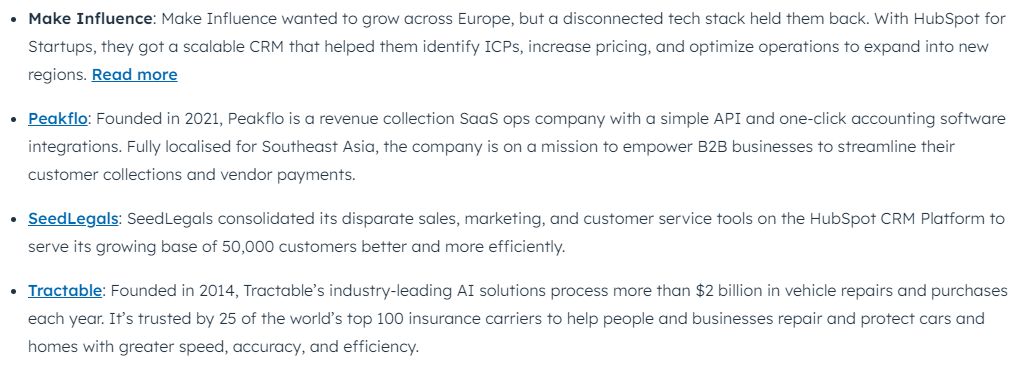
Case studies of HubSpot further highlight its effectiveness in improving lead generation and streamlining marketing automation. These success stories often emphasize the platform’s ability to unify marketing, sales, and service operations into a cohesive workflow, resulting in improved customer engagement and sales outcomes.
Salesforce’s User Feedback and Case Studies
Salesforce, with its comprehensive and customizable CRM solution, typically receives high marks in customer reviews for its scalability and extensive feature set. Reviews often point out Salesforce’s ability to handle complex business processes and provide deep insights into customer data.
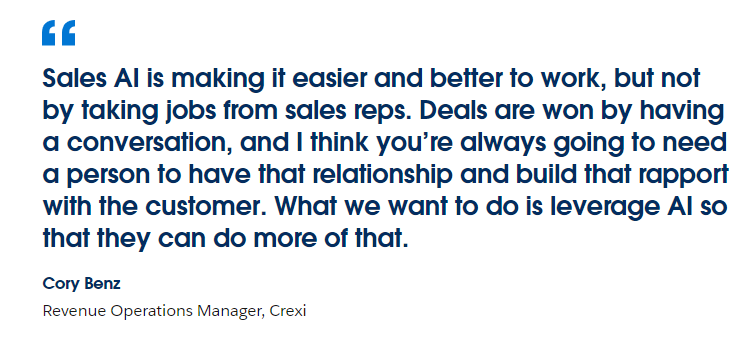


Case studies of Salesforce showcase its prowess in managing large-scale CRM implementations, offering solutions for complex sales cycles, and providing robust analytics. These studies frequently illustrate how Salesforce can be tailored to meet the unique needs of large enterprises or businesses with specific CRM requirements.
Balancing Perspectives in CRM Decision Making
When evaluating HubSpot vs Salesforce based on customer reviews and case studies, it’s clear that both platforms have their strengths, appealing to different types of businesses. HubSpot is often favored for its ease of use and efficiency, ideal for businesses seeking a straightforward CRM solution. In contrast, Salesforce is lauded for its adaptability and depth, catering to businesses needing a highly customizable and comprehensive CRM system.
Conclusion
In our comprehensive comparison of HubSpot vs Salesforce in 2024, we have navigated through various aspects of these leading CRM platforms, from their ease of use and feature sets to pricing, security, and mobile capabilities. Both HubSpot and Salesforce have their unique strengths and cater to different business needs and preferences.
HubSpot stands out for its user-friendly interface, ease of use, and comprehensive inbound marketing tools. It’s an excellent choice for small to medium-sized businesses or those that require a straightforward, integrated CRM solution. HubSpot’s transparent pricing and robust community support make it an accessible and valuable tool for businesses looking to streamline their marketing and sales processes.
Salesforce, on the other hand, offers a more extensive and customizable platform. With its advanced features and scalability, it is well-suited for larger businesses or those with complex CRM requirements. Salesforce’s robust analytics, detailed reporting, and comprehensive ecosystem make it a powerhouse for businesses that need a CRM solution capable of handling intricate workflows and providing deep insights.
Ultimately, the decision between HubSpot and Salesforce will depend on your business’s specific needs, size, and the complexity of the CRM functionalities required. We recommend considering factors such as ease of use, customization capabilities, integration needs, and budget when making your choice.
Both HubSpot and Salesforce are continually evolving, and staying informed about their updates and new features is crucial for making the best decision for your business. Regardless of your choice, both platforms offer the potential to transform your customer relationship management, streamline your processes, and drive your business towards greater success.

